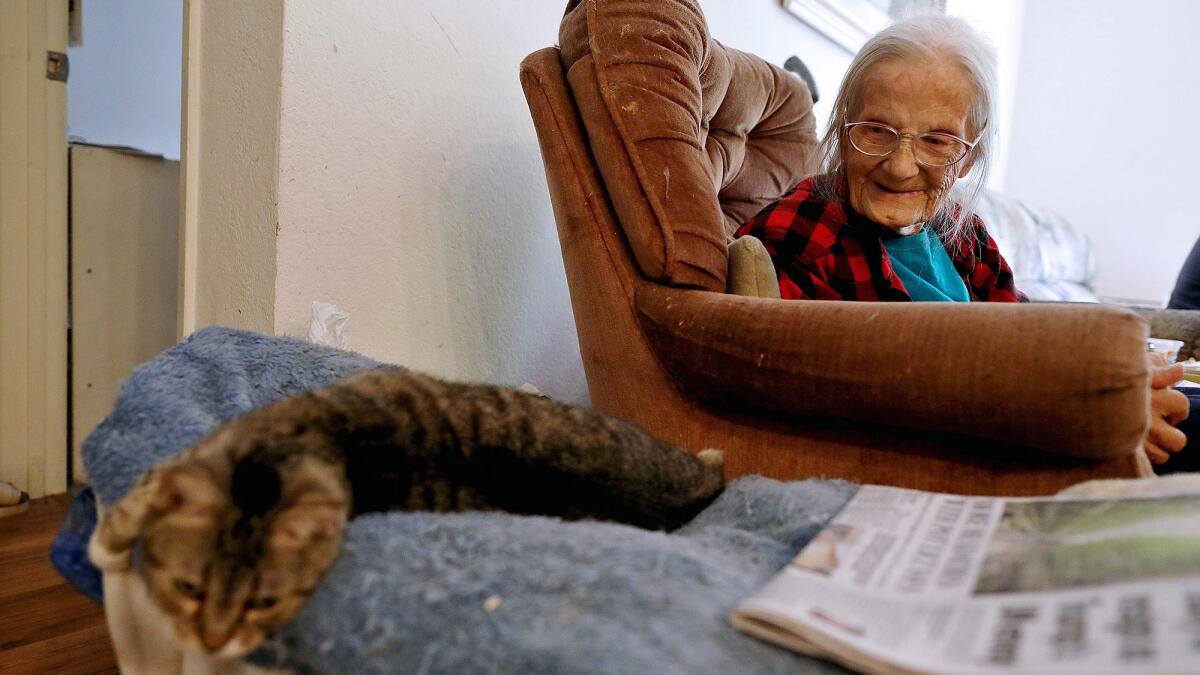L.A. City Council moves to outlaw discrimination against Section 8 tenants

The Los Angeles City Council on Wednesday moved forward with a law that would bar landlords from refusing to consider tenants with Section 8 vouchers.
In a 12-0 vote, the council instructed the city attorney to draft an ordinance that would extend protections against so-called source-of-income discrimination to people who pay with vouchers.
Housing advocates say the law is needed because Section 8 bans are often used as a proxy to discriminate by race or class, and research has shown landlord acceptance rates are higher in places with the ordinances.
“We have a significant barrier to affordable housing in this city and that is the denial of people who have Section 8 vouchers,” Councilman Paul Krekorian, who proposed the legislation, told the council before the vote.
Nearly half the people who received a voucher in Los Angeles had it expire in 2017 before they found a place, up from 18% in 2011, according to the latest available data.
Given Los Angeles’ affordability and homelessness crisis, Krekorian called the expirations “unconscionable.” Making matters worse, low usage rates could equal less voucher funding in the future, given federal formulas.
“It becomes a never-ending downward cycle,” Krekorian said in an interview.
Once the city attorney drafts the ordinance, the proposal would need to come back to council for final approval to become law, though such votes can be a formality. If passed as is, the law would take effect on Jan. 1, 2020.
A growing number of municipalities, including San Diego and Santa Monica, have passed source-of-income voucher laws as tenants increasingly can’t find landlords who accept the vouchers. Experts say the federal rent subsidies have not kept pace with rising rents that higher-income tenants are willing to pay.
Although the proposed law does not directly address the problem of soaring rents, it does prohibit blanket Section 8 bans and outlaws common advertisements that state vouchers aren’t accepted. A recent Urban Institute study found that 76% of Los Angeles County landlords with units affordable to Section 8 tenants refused to accept vouchers.
Among the reasons landlords cite for not accepting Section 8 vouchers are concerns over government red tape or a belief that people who need the subsidies are problem tenants, according to the Urban Institute and other studies.
Housing advocates say those beliefs are inaccurate and can reflect negative stereotypes of low-income households, as well as racism against people of color, who make up the majority of voucher holders.
The Apartment Assn. of Greater Los Angeles, which represents mom-and-pop landlords, opposes the proposed ordinance, saying it would essentially force landlords to participate in a program many shun because it can be cumbersome and overly bureaucratic.
Section 8, for example, requires landlords to have units inspected before they can be rented with the federal subsidy, and the association said wait times to conduct those checks can be long and delay rent payment.
The city’s housing authority said it’s working to reduce wait times to two days and Krekorian promised to work with landlords and the bureaucracy to “streamline the process to the greatest degree possible.”
Section 8, which gets its name from a section of the federal Housing Act, was launched in the 1970s as an alternative to costly public housing projects, which were criticized for segregating poor families in neighborhoods with low-quality schools. However, low subsidy levels and negative stereotypes, advocates say, have restricted the ability of families to move into neighborhoods with more opportunities.
In addition to banning source-of-income discrimination against Section 8 tenants, Los Angeles’ proposed ordinance would stop landlords from rejecting tenants outright who pay through other subsidy programs, including those specifically designed to house homeless individuals.
If the ordinance becomes law, Los Angeles would join 11 states and nine cities with policies in place to outlaw blanket Section 8 bans, according to a city report.
A pending state bill, Senate Bill 329, would extend those protections across California.
More to Read
Inside the business of entertainment
The Wide Shot brings you news, analysis and insights on everything from streaming wars to production — and what it all means for the future.
You may occasionally receive promotional content from the Los Angeles Times.











